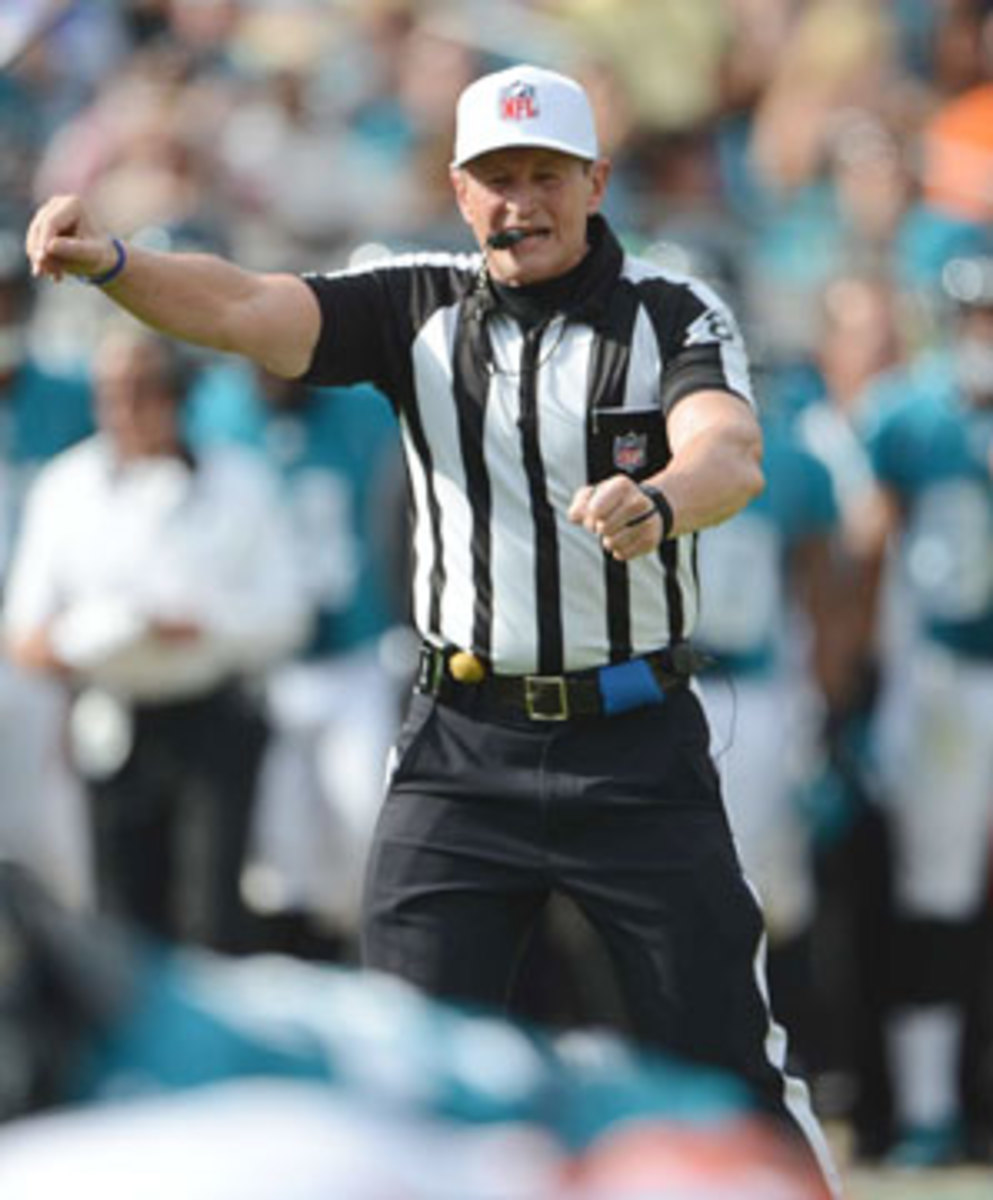Ed Hochuli unplugged: his life outside the stripes and food vice


Steve Rushin writes about Ed Hochuli in this week's issue of Sports Illustrated. Get Sports Illustrated All Access and buy the digital version of the magazine here.
Next to the computer in his football-festooned home office, Ed Hochuli keeps a yellow Post-it note that reads I [HEART] U PAPA T.
Papa T is short for Papa Touchdown, the nickname his 10 grandchildren have given the NFL's most famous referee -- its only famous referee -- a man who appeared as himself (in cartoon form) on The Cleveland Show and as himself (in virtual form) in the Madden NFL video game -- a game he has never actually played.
Nor is Ed Hochuli likely to have seen his name appear in a skit on last Thursday night's special edition of Saturday Night Live, a clip he will not be catching on Hulu, either, for Hochuli has become a presence on the Internet without spending much time on the Internet. Thank goodness for his six children, who range in age from 24 to 39. "I know my children are proud of me," he says, "by the stuff they forward to me."
Some of that forwarded material is delightfully unflattering, as I learned while reporting a cover story on Hochuli for this week's Sports Illustrated. "We tend to try to bring him down a little bit," says one of his sons, Shawn, a Pac-12 football referee. "When he screws up a [penalty] announcement, we let him hear about it."
Shawn, a financial advisor in southern California, officiated dozens of high school football games without telling his father, who casts a large shadow in the officiating world -- in every sense of the phrase, given his famous biceps. But one week Shawn called his dad and asked him to fly in for an important seminar he was giving at a high school on the importance of the 403(b), a tax-advantaged retirement savings plan.
"I'm sure he was thinking 'This is going to be boring as hell'," says Shawn. "But he came." Driving from the airport to the school, Shawn let his dad know that in fact he was on his way to referee a game, and had been officiating games for two or three years. He was finally ready to have his father, one of the NFL's all-time best referees, watch him work.
"Everybody probably idolizes their parents," says Shawn, who is no exception. "Once a year or so my dad comes to a game I'm working and I still don't want to start until I've found him in the stands." After every one of Shawn's games -- he worked the Arizona State-Cal game last Saturday -- Ed asks him to text back three ratings: The first represents how well the officiating crew performed. The second represents how well Shawn himself performed. And the last number represents how enjoyable the game was.
"My dad is always more concerned with how his crew performed than with how he performed," says Shawn. "He will throw himself under the bus to get a guy on his crew off the hook."
Toward that end, Ed Hochuli has absorbed the wrath as well as the praise of NFL coaches for the better part of 22 seasons, often in the same breath. As the young coach of the Raiders, Jon Gruden was miked during a game that Hochuli refereed. "I like this ref!" Gruden yelled. "Always like this guy!" And then, in the next cut, "Are you f-----' kidding me? This is the worst officiating I have ever seen. Are you s-------g me?"
As coach of the 49ers and Lions, Steve Mariucci would pretend to consider at length whether he wanted to accept or decline a penalty that would advance his team 20 yards. "Let me think about that one Ed," he would say, followed by much chin-stroking and temple-tapping. "Should we take that penalty or should we decline it?"
As a trial lawyer, Hochuli enjoys the cut-and-thrust of public banter. "A lot of people think I speak too much," says Hochuli, who founded Jones, Skelton & Hochuli 30 years ago with five lawyers (the firm now has 75). And that accusation is not entirely without foundation. Last week, as Hochuli moderated his weekly conference call on rules for the NFL's 121 officials, his phone was accidentally muted for 15 full minutes. When he came back on the line, he had a terrible epiphany: "I've been talking for the last 15 minutes and nobody could hear me."
*****
You have to get up pretty early in the morning to fool Ed Hochuli. This is literally so, considering his ridiculous hours, 50 of which are devoted to law, and an equal number devoted to refereeing duties. His mentor, the former NFL referee Jerry Markbreit, was up early on the morning after the Monday Night Football game in Seattle that ended with the infamous "simultaneous catch" ruling that cost the Packers a victory. Markbreit called Hochuli at 6:15 from Skokie, Ill., momentarily forgetting that it was 4:15 in Phoenix. Says Markbreit: "Ed answered the phone and said, 'What do you think, I don't sleep?' "
In fact, Hochuli had already started his day. He is usually out the door by 5:30, knowing that he'll have to squeeze in a two-hour workout mid-afternoon. Having become renowned for his biceps, he must maintain them in perpetuity. "It's kind of a bad situation I've created," he concedes, one which forbids him to go to seed in the public eye, even though, as he says, "There are many days that I can't stand the thought of going to the gym."
He goes anyway. On a 97-degree day in Tempe, he drove me to the gym in his Mercedes equipped with the license plate NFL 85. (Hochuli was Ochocinco long before Chad Johnson was.) He asked why I hadn't worn workout gear. For the same reason I wouldn't interview Eric Clapton while holding a guitar: I would look ridiculous by comparison.
Strangers always ask Hochuli how much he can bench and he always gives the same answer: "I don't know."
Gesturing to a bench press, he said, "I don't know how much I can lift because if I can't lift it six times, I'll reduce the weight. I don't want to lift 300 pounds. At my age, my joints just can't take it." After a brief interval of introspection, he said: "The real reason I don't know is I don't want to know how weak I am."
Hochuli concedes that he wants to look like an athlete, that players respect officials who look the part. But the brain is of more use than the body in both his jobs. There are only about half a dozen lawyers among the NFL's 121 officials, and if any one profession predominates it is education: Teachers, principals and school administrators, men experienced at bringing order to unruly groups of children.
Rules are helpful in this regard, but the best referees know when to ignore the rules, too. On Sep. 25, 2006, the New Orleans, Saints played their first game in the Superdome since Hurricane Katrina. At the pregame coin toss, former President George Herbert Walker Bush joined the team captains at midfield along with Hochuli, the referee in the white cap, the only man authorized to start an NFL game. Inspecting the coin, President Bush decided to toss it himself. Hochuli decided, wisely, that he was not going to wrestle the coin from the President. One cannot always be hidebound by the rules.
In that same spirit, Hochuli adheres to a strict diet, but is not above breaking its rules. He allows himself the occasional fall-off-the-wagon food. He loves chocolate, but Cheetos are his Kryptonite. If some Sunday on national TV you see his zebra stripes besmirched by orange dust, he told me, "You'll know why."
